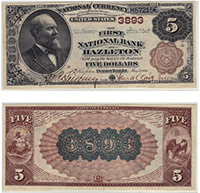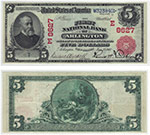Values & Information For Early National Bank Notes
First Charter Bank Note Price Guide
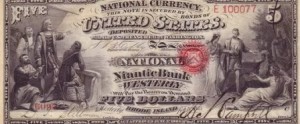
We Buy All First Charter National Bank Notes
- Printed By National Banks That Opened Between 1863 and 1881
- Some Notes Have Spiked Red Seals (as above), Some Have Rounded Red Seals
- Some Notes Have A Red Charter Number, Others Will Not
- Most Are At Least Scarce, High Grade Examples Command Premiums
- Any Bank Notes From The West Or South Are Likely Rare
- The Serial Number In The Lower Left Area Can Be Important
- Issued for $1, $2, $5, $10, $20, $50, $100, $500, & $1000 Denominations
One Dollar National Bank Notes
$1 First Charter Paper Money
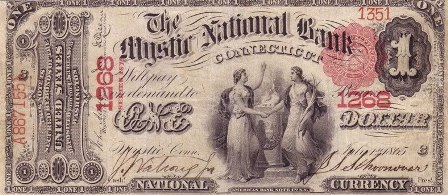
One dollar national bank notes were only issued between 1863 and 1878. They were discontinued because most people preferred coins for lower denominations instead of paper money. Due to the short time of printing, most $1 national bank notes are very rare today. A one dollar note from the South or West will usually be rare. Most collectors refer to these notes as aces.
Two Dollar National Bank Notes
$2 First Charter Paper Money
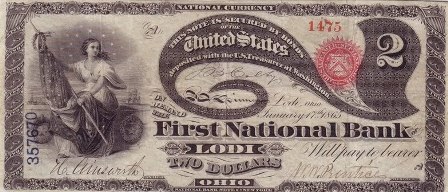
Two dollar national bank notes are extremely rare (in most circumstances). They were only printed between 1863 and 1878. Many banks did not even issue this denomination. Today this denomination is referred to as a Lazy Deuce by many collectors. The nickname comes from the fact that the large two on the front of each bill is laying on its side being lazy. These are almost always worth a couple thousand dollars or more.
Five Dollar National Bank Notes
$5 First Charter Paper Money
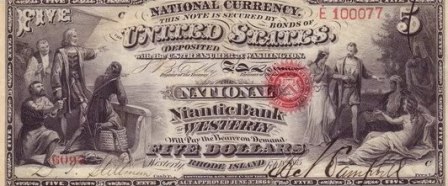
Five dollar first charter national bank notes are the most common for the series. However, the word common is really a misnomer, as some $5 bank notes can still be very rare. Notes like this are valued based on their condition, serial number, and bank of issue. Generic low grade examples might be worth less than $1,000. Something rare that also has eye appeal could be worth several thousand dollars or more.
Ten Dollar National Bank Notes
$10 First Charter Paper Money
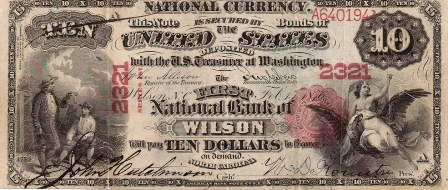
Ten dollar first charter notes were issued in two different combinations. Some sheets were printed each with four ten dollar bills. Other sheets had three tens and a twenty. Ten dollar bills from 1881 and earlier do command more money compared to a five, but they are still relatively common compared to one, twos, and the denominations higher than $10. Prices range widely. Consult us for exact pricing.
Twenty Dollar National Bank Notes
$20 First Charter Paper Money
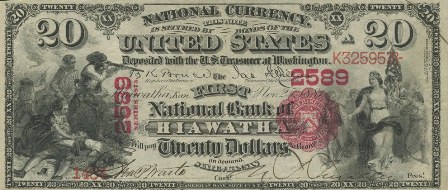
Twenty dollar national bank notes from the first charter period are quite rare. However, they don’t really sell for much more money than a five dollar note. Many national banks only wanted to issue five dollar bills back in the day. Furthermore, even when $20 bills were printed, they were printed in an odd combination with ten dollar bills that limited their quantity. Most all of them are worth $1,500 or more based on condition.
Fifty Dollar National Bank Notes
$50 First Charter Paper Money
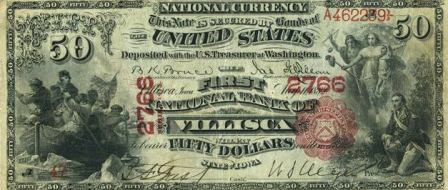
Fifty dollar national bank notes printed between 1863 and 1881 are very rare. These higher denominations were usually only printed by large banks in metropolitan areas like Boston, New York, Philadelphia, Baltimore, etc. Somewhere around 100 of these rarities are known to exist today. We are aggressive buyers of such bills, and would love to see a picture of what you have.
One Hundred Dollar National Bank Notes
$100 First Charter Paper Money
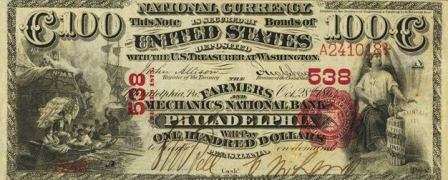
The one hundred dollar first national bank note is the highest denomination that a collector can buy for less than a million dollars. Most of these notes sell for $10,000 or more, provided they are in good condition with no tears, rust, stains, etc. Any high denomination like this from a national bank in the South or West should be considered especially rare.
